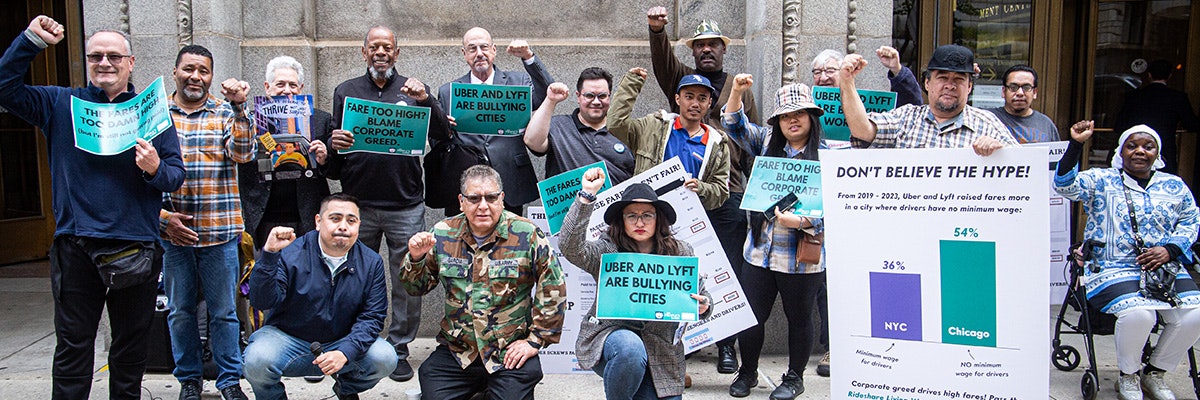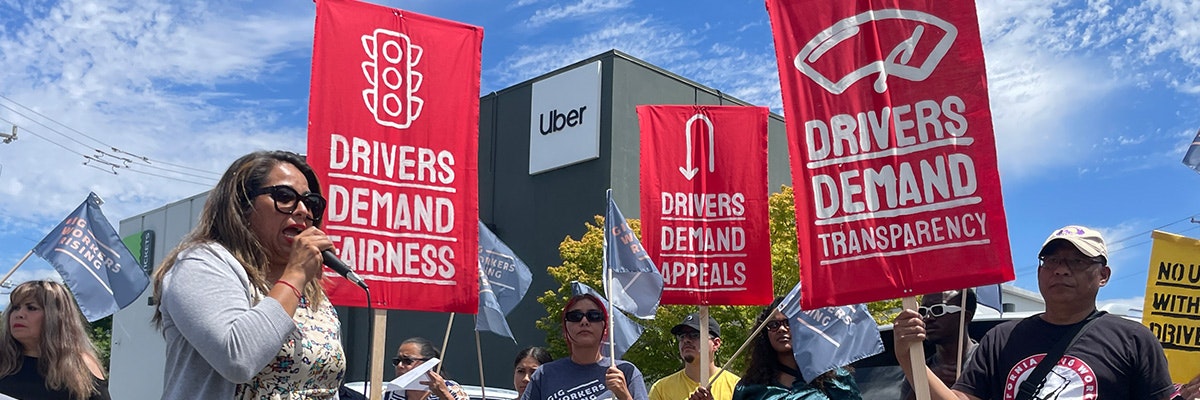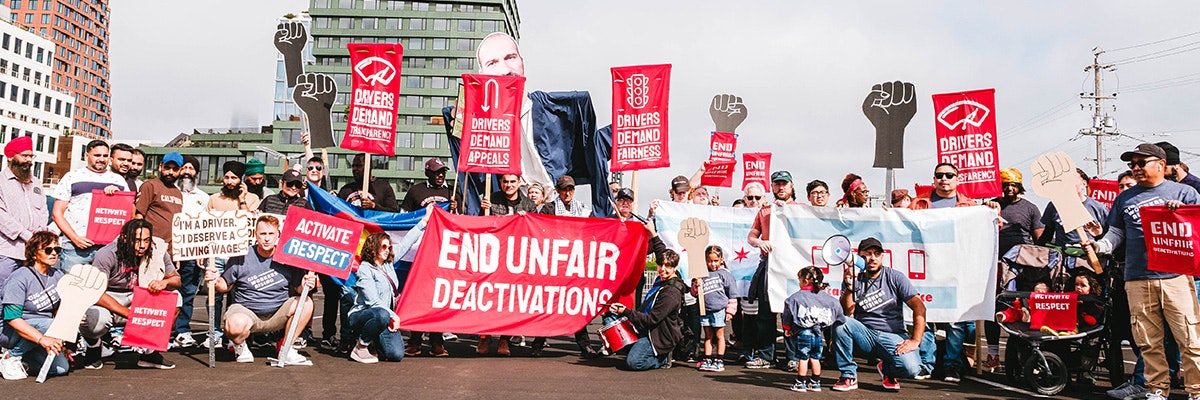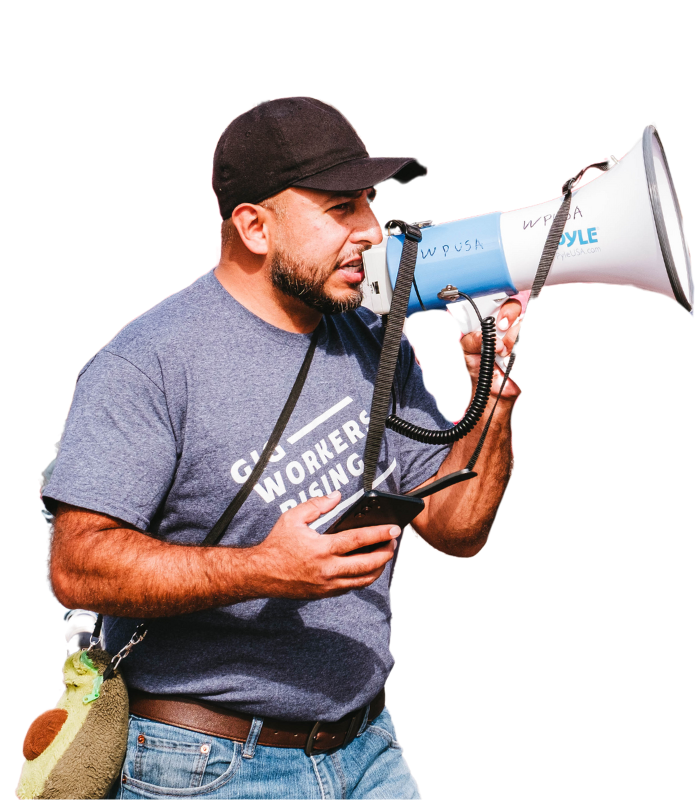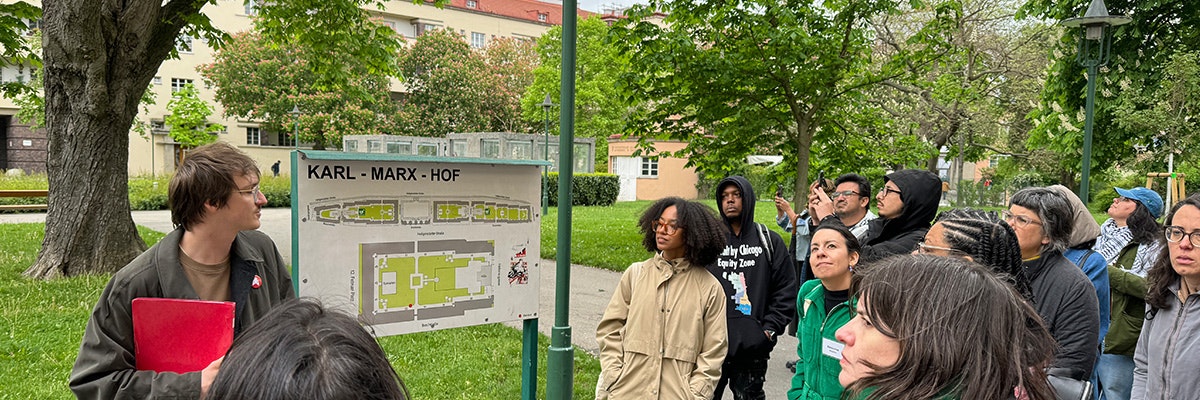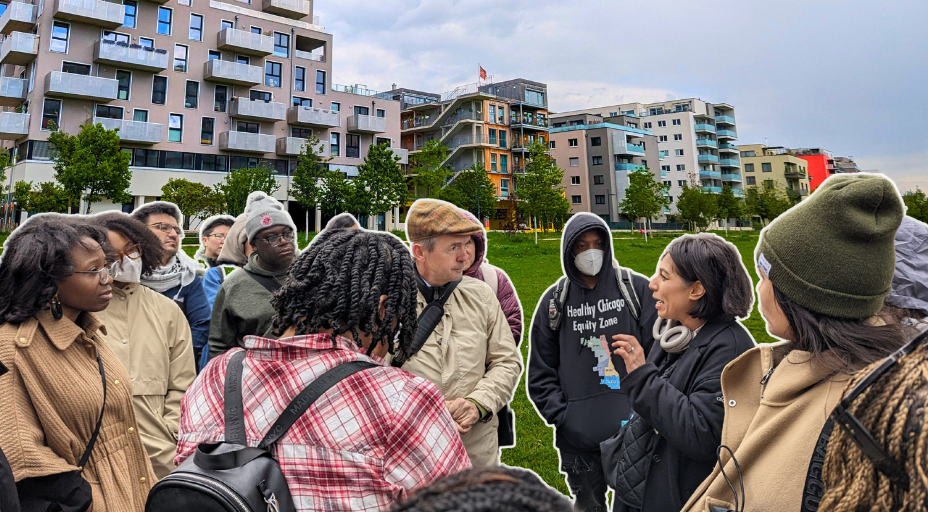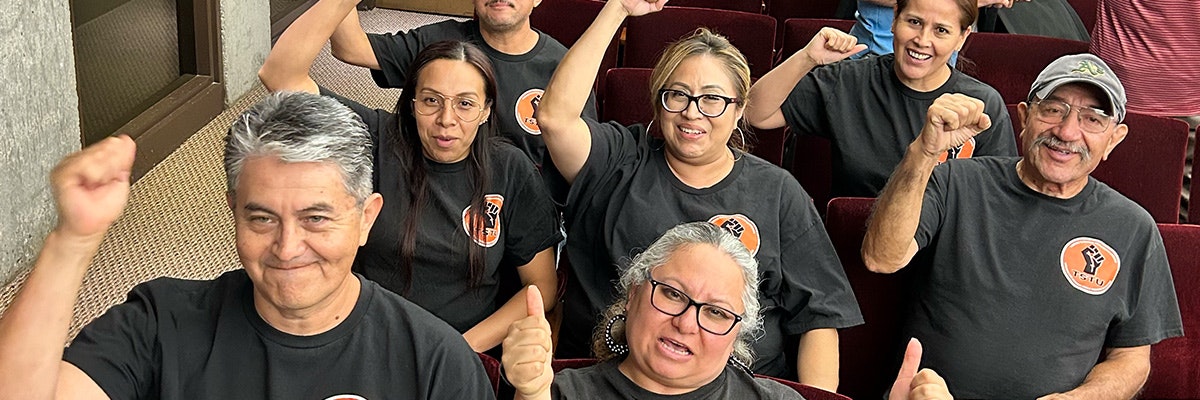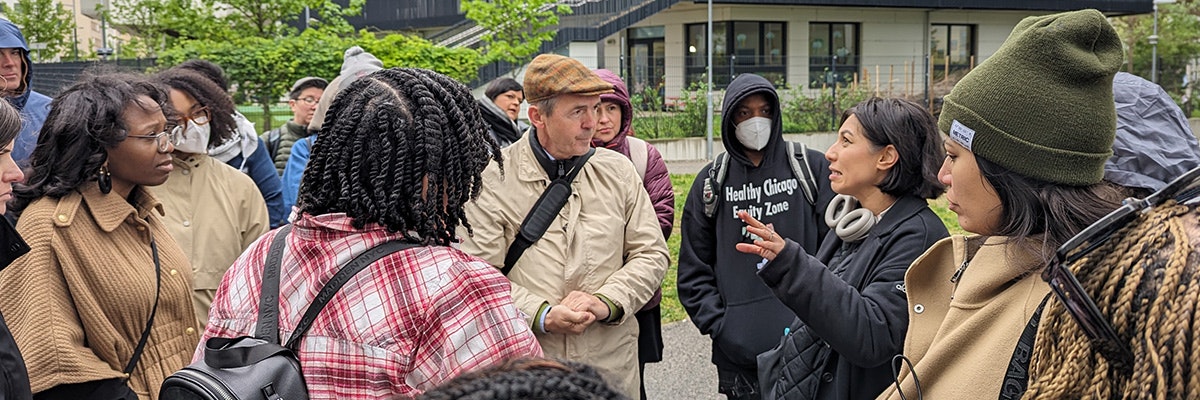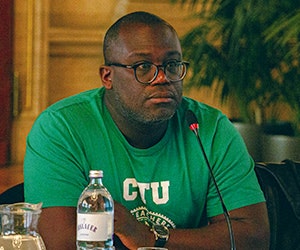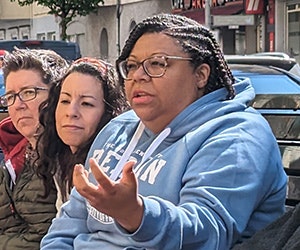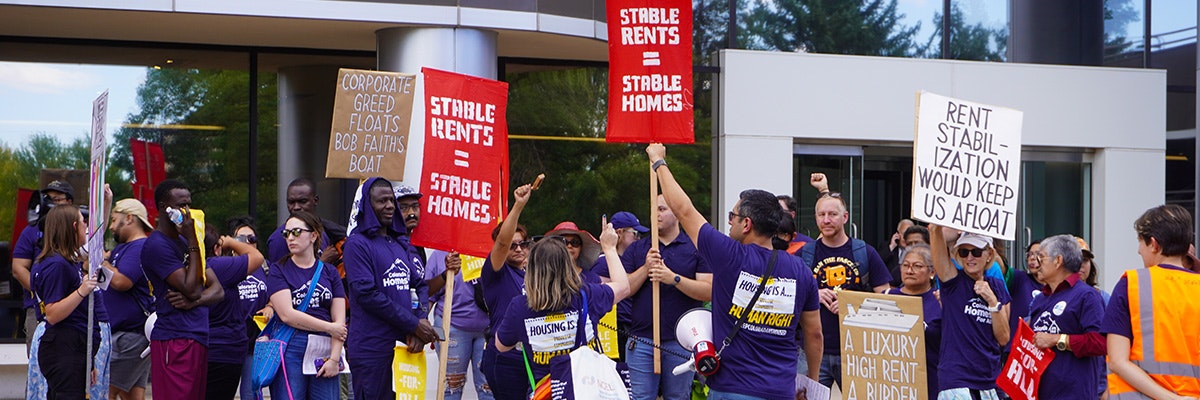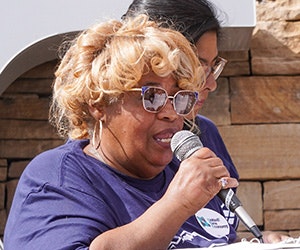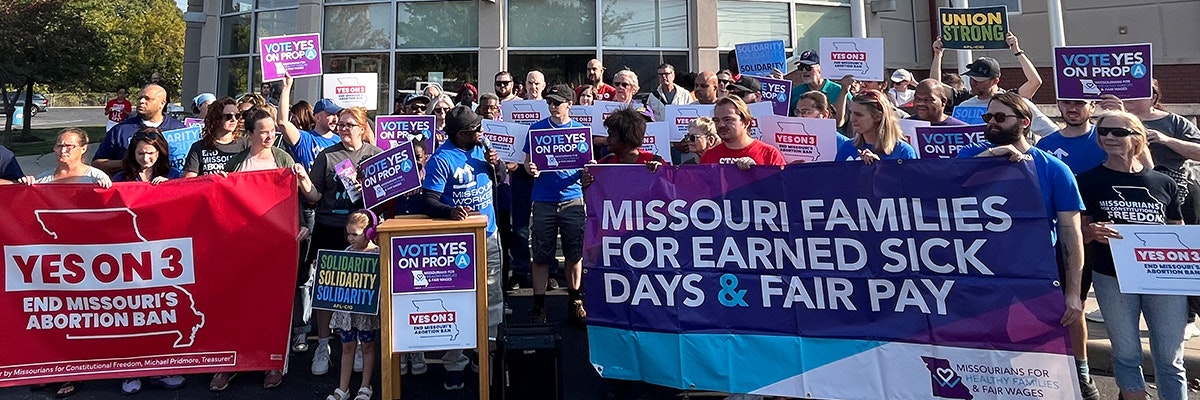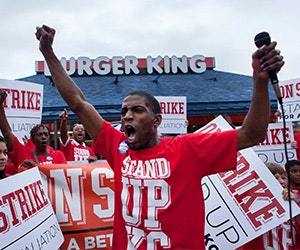report
2024 Year in Review
“Politics does not reflect majorities, it constructs them.”
— Stuart Hall
We are entering daunting times, and a moment that calls for deep solidarity. The incoming presidential administration has promised a campaign of mass deportations, embraced autocracy at home and abroad, and intends to hand the reins of the federal government over to the richest person in the world to slash funding for education and healthcare. We must and will show that we will not be cowed, that we will stand up for our neighbors and coworkers.
Yet as we defend our communities, we must also focus on the work that will ultimately free us from the grip of would-be strongmen and their billionaire backers: building a governing majority that believes in multiracial feminist democracy.
We will not escape authoritarianism until more people understand their pain — low wages, sky-high rents, soaring prices at the grocery store — to be the result of an economic system shaped by corporations, rather than scapegoating immigrants, trans folks, unhoused people, Black youth, and other marginalized communities. Nor can we restore faith in our public institutions until more of us have experienced firsthand how government can be a tool to advance our collective well-being instead of a puppet of wealthy elites.
This is no small task. It requires us, our movement allies, and philanthropic partners to act with courage, humility about where we need to dig deeper, a commitment to moving in unity, and a conviction that we can make real the world we dream of.
Right now, I draw hope from organizing happening across our network that illustrates how we move forward:
Uber and Lyft drivers joining forces across cities to overcome Uber’s bully tactics and make their jobs safer.
Renters calling out the corporate landlords behind our housing crisis and laying a policy and narrative foundation for community-controlled land and housing.
Low-wage workers coming together across race and industry to overcome a state ban and win paid sick days and a historic $15 minimum wage in Missouri.
We are incredibly proud of all that we accomplished this year, and we know it is not enough. Our movement must bring to scale these kinds of organizing projects and campaigns, so more people see their stake in the well being of everyone. In the coming year, our network will be growing our base building programs, testing new popular education and meaning-making efforts, and expanding the geographies in which we operate — and throughout, concentrating a spotlight on the corporations harming working people and our communities.
As you explore this report, I hope you find inspiration in the powerful work taking place in cities and states all across our country. Even as we will face headwinds federally, we can and must grow local communities’ power to govern and show what’s possible when people come together.
This is how we remind each other what love in public looks like: fast food workers turning out on their day off to join ridehail drivers marching for better jobs, renters refusing to let their landlord evict their neighbor for requesting basic repairs, communities coming out to insist everyone in their city needs safe water and clean air. I believe in my bones that this public love will carry us through the dark moments, and towards our shared liberation.
With love and solidarity,
Lauren Jacobs
Executive Director
This year, our network:
Improved the lives of over
48 million
people all across the country
Won over
$7.7 billion
for community priorities
Led or co-led
80 coalitions
made up of over 2,000 member organizations
Explore the report:
Building the capacity to govern
We should all be able to weigh in on the decisions that shape our lives — at the ballot box, in the halls of government, at our workplaces, and in our homes and neighborhoods. As a network, we’re growing the base of people, organizations, and geographies necessary to shift governing power from corporations to our communities:
Working in coalitions is core to our approach: bringing together people and organizations with different strengths and interests increases our collective power and helps everyone involved see a fuller picture. This year, our network played a leadership role in over 80 coalitions with over 2,000 member organizations.
Elections are key moments when overlooked communities can make their voices heard and directly enact priorities like higher wages and affordable housing. This year, our affiliates and national team knocked on over 480,000 doors and made nearly 1.5 million phone calls to infrequent and underrepresented voters.
To transform our country, we need to expand the geographies in which our network is organizing, particularly in the south. For the past several years, our national team has helped seed a new organization in Texas’s Gulf Coast, New Economy for Working Houston. This year, NEW Houston hired their inaugural executive director and officially joined the network as our latest affiliate.
363
staff across our network
$55 million
total 2024 network budget
Over 1/3
of the US population lives in regions where our affiliates organize
Network highlights
From winning billions for housing and climate to raising standards for workers and renters, our network of 21 grassroots affiliates is driving transformational change in communities across the US.
Explore the map to see some of the highlights from 2024:
Organizing with Uber drivers to activate respect
Multi-city power building and leading edge research to counter Uber's scare tactics.
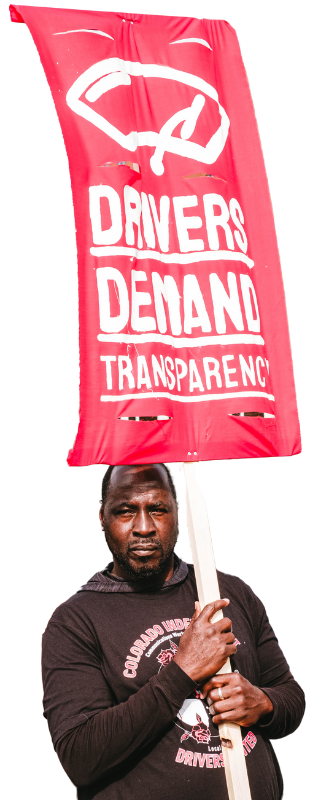
App corporations are harming drivers and riders alike — and using their money and market dominance to hinder reforms.
Uber, Lyft, DoorDash, and other app corporations borrowed billions from Wall Street investors while undercutting competitors and undermining alternatives like public transport. Now that these firms dominate the market, they’re raising prices for customers while making work more dangerous and precarious for drivers. And when the drivers and communities organize, Uber tries to buy, bully, and bamboozle its way out of higher standards.
We’re connecting driver groups to build shared power and counter Uber’s bullying.
This year, we organized with driver groups from across the country to launch a multi-city campaign to end unfair “deactivations” — when Uber cuts drivers off from working with little explanation or recourse. And we pulled back the curtain on Uber’s scare tactics and deceptive arguments, equipping communities with the facts and data to stand up to Uber’s bullying.
Advancing our long term agenda
Reining in Corporate Power
Uber and Lyft use their money and market power to undermine democracy and make jobs worse. We’re shining a spotlight on their attempts to bamboozle us, and winning new laws to curb their abusive practices.
Growing Civic Organizations
Drivers are often isolated from each other, and years of debate about their employment classification have put up barriers to unionization. We’re organizing with local driver groups to create virtual and physical spaces where drivers can come together and wield their collective power.
Shaping a People’s Economy
Uber and Lyft rely on a largely BIPOC and immigrant workforce — the same communities who have been excluded from labor protections time and again. We won’t stand for that, so we’re campaigning to raise conditions for the people working in this industry, and to keep the “gig” business model from making all our jobs less secure.
Building Authentic Democracy
From spending millions on ballot measures and lobbying to threatening to leave entire states, app corporations like Uber regularly interfere in our democracy. We’re building the driver power necessary to hold these corporations accountable.
![Uber drivers with Chicago Gig Alliance at a press conference with signs reading "don't believe the hype"]()
Photo: Deana Rutherford/Chicago Gig Alliance Showing Uber’s favorite scare tactic doesn’t reflect reality
Nearly every time drivers come close to winning improvements, Uber and Lyft trot out the same line: that paying drivers more will force them to jack up fare prices for riders. We decided to test that claim.
We analyzed over a billion rideshare trips in New York and Chicago (it was the largest-ever study of rideshare fares). If Uber’s claims are true, fares should have gone up more in New York, where drivers won a minimum pay standard. In fact, the opposite happened. Uber and Lyft raised fares more in Chicago, the city where drivers have no pay protections.
To make sure policy makers and riders know the truth, we wrote an op-ed in The Hill, worked with More Perfect Union, and partnered with influencer Raven Schwam-Curtis. We also shared the report with legislators in Minnesota, Chicago, and Toronto.
![Uber drivers rally outside the Uber hub in San Jose to launch the Activate Respect campaign]()
Launching a multi-city campaign to end unfair deactivations
Being suddenly cut off from working is one of the top issues drivers bring up. One study found that 40% of all surveyed drivers reported having been deactivated — sometimes for a few days, sometimes permanently.
This year, we partnered with ACRE and driver groups from Chicago, Colorado, and the Bay Area to develop a coordinated, multi-city campaign to win new rules that protect drivers from these unjust suspensions and firings. In June, the Activate Respect campaign launched with rallies at airports and Uber hubs.
The campaign is both pushing for change at Uber, and organizing for policy protections. In Colorado, drivers won legislation requiring app corporations to provide greater transparency about pay and deactivations. In Chicago, deactivation protections are a key element of the Rideshare Living Wage and Safety ordinance that drivers are championing. And in the Bay Area, drivers worked with us to craft a digital rights popular education curriculum that is now being used across industries and geographies.
![Uber drivers from Chicago, Colorado, and San Jose rally before marching to Uber HQ in San Francisco]()
Bringing drivers’ demands to Uber’s front door
By fall, we could tell Uber was feeling the pressure. The corporation announced it would make some nationwide changes to its policies — many modeled on legislation drivers had won locally. These were steps in the right direction, but didn’t address the campaign’s core demands for transparency, fairness, and an appeals process.
To turn up the heat, we worked with drivers to take their demands straight to Uber’s headquarters in San Francisco. Gig Workers Rising anchored the action, and delegations of drivers flew in from Chicago and Colorado. In an apt demonstration of how hard it is for deactivated drivers to reach Uber to appeal, the corporation refused to meet with drivers and threw their letter to the ground. Undeterred, drivers shared their stories of unfair deactivation with press, drivers from other cities, and a giant puppet of CEO Dara Khosrowshahi.
Drivers have more power when we work together across cities. PowerSwitch has been an invaluable partner, connecting us with other groups to share lessons, strategize together, and help drivers recognize that we’re far from alone in this fight.
![Cesar Palancares with Gig Workers Rising speaks on a megaphone]()
And we're just getting started. In 2025, drivers and allies will continue to build power by organizing, telling their stories, and demanding change, and together we will expose Uber's unfair practices to grow the movement for new rules and protections for drivers and passengers.
Moving towards community-stewarded land and housing
Tenant organizing, corporate campaigning, and bold policy solutions to win housing in the public interest.
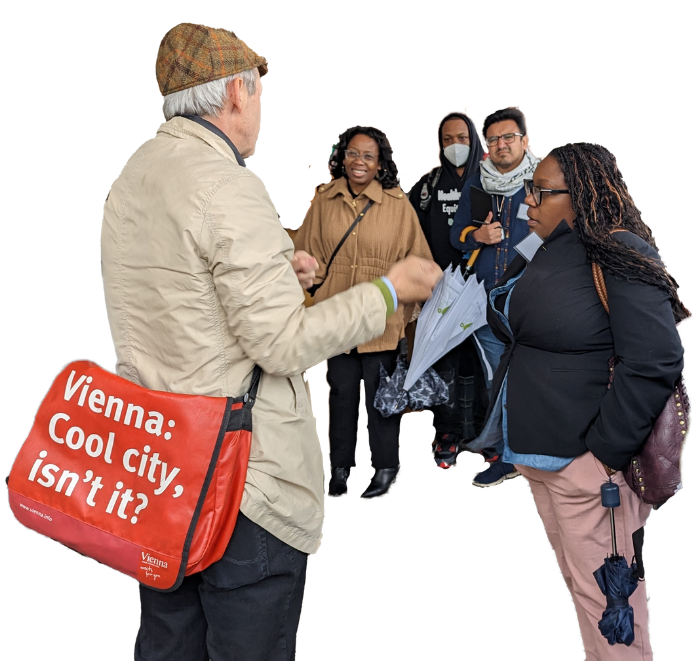
Corporate landlords and the real estate industry are hurting renters and families, turning our basic need into a profit model.
Corporate landlords like Greystar and Blackstone have an outsized influence on where housing is built, who it’s for, and how much it costs. Large corporate landlords use algorithmic price setting to charge as much as they can, while paying little attention to the needs of tenants. Meanwhile, corporate landlords operate through industry associations and lobbying groups at local, state, and federal levels to block protections that help tenants stay rooted in their communities.
We’re building power with renters, organizers, and elected officials to put public land and housing in the hands of our communities.
This year, we helped our affiliates and their partners sharpen their analysis of how corporations are controlling our housing and grow strong, aligned coalitions to stand up to deep-pocketed real estate interests. We drew inspiration from social housing and tenant organizing projects in Vienna and Berlin, and brought those lessons into campaigns here that are building a foundation for community-stewarded land and housing.
Advancing our long term agenda
Shaping a People’s Economy
The real estate industry has turned our housing into a commodity centered entirely around profit. We’re reimagining a housing system that is centered around everyday people’s needs — one that is affordable, high quality, and sustainable.
Building Authentic Democracy
Corporate landlords, lobbyists, and the real estate industry interfere in our democracy, pouring millions of dollars into campaigns to defeat rent control and other tenant protections. We’re fighting to ensure that everyday folks have a say in the decisions that impact our homes and communities.
Growing Civic Organizations
Corporations aim to carve up our communities for profit, uprooting renters and families and stripping everyday people of our sense of self-determination. We’re supporting tenants who are organizing across the country, building power together, and winning critical renter protections.
Reining in Corporate Power
Corporate landlords buy up housing units across the country, raising rents and inflating housing costs, while pricing out working people and families. We’re exposing their greed and confronting corporations in their offices, in the streets, and in halls of power.
![Our social housing delegation explores Karl Marx Hof in Vienna]()
Drawing inspiration from housing models in Vienna and Berlin
When we take housing out of the hands of corporations and the private market, we can put it under the control of communities and in service of the public good. Our homes can be high quality, comfortable, affordable, accessible, and community-centric — and there are models around the world from which we can take inspiration and practical guidance.
In April, we brought housing organizers, elected officials, and city staffers from across the country on a trip to Vienna and Berlin to learn about how community-controlled housing models are shaped and nurtured:
For over a century, Vienna has been using public land to build municipal housing developments complete with libraries, child care centers, and post offices, and is now looked to as a model for social housing by policymakers across the US.
Berlin is struggling with a housing crisis after selling 200,000 public housing units to private landlords, and a mass movement is organizing to reclaim land and put it under community control.
We met with city officials and campaign organizers, visited social housing projects and neighborhoods, and returned home full of ideas and plans for our own cities.
![Leaders with the Todos Santos Tenant Union]()
Equipping tenant leaders to organize and govern
In Vienna and Berlin, we saw firsthand what’s possible when tenants collectively shape their homes — from opening up spaces for refugees to tenants fighting unhealthy building conditions when ownership of an apartment building switched from a small landlord to a large profit-driven one.
In the US, our network is organizing and equipping tenant leaders with the skills to organize their neighbors and challenge the power of real estate.
Last year, we supported EBASE in designing their Tenant Leadership Institute, a 6-week program that trained ten leaders — mostly Spanish-speaking women of color who are part of the Todos Santos Tenant Union — in housing justice, political education, and civic engagement strategies as well as stress management and building solidarity among neighbors.
This year, those leaders used their skills to help win just cause for eviction and rent stabilization policies in the City of Concord. They also helped recruit and train a second class of leaders. The leadership institute was conceptualized with the help of PowerSwitch staff.
PowerSwitch Action has helped us be more strategic and more daring. Going on the trip to Vienna and Berlin opened my eyes to what is possible in terms of creating green social housing, and we are now making that part of our concrete goals moving forward.
![Delegation members from Chicago talk to city planners in Vienna about social housing]()
Funding social housing in Chicago
For the past two years, we’ve been working with Grassroots Collaborative and the Illinois Green New Deal coalition to show what green social housing can look like in Chicago. A key reason for our network’s trip to Vienna and Berlin was to bring Chicago coalition leaders and city officials to witness what community stewarded housing could look and feel like.
In Vienna, our delegation toured social housing units and learned about the city’s climate strategies while in Berlin, we talked with organizers about a powerful campaign to re-socialize housing that was sold off to private corporations.
As participants walked the grounds of beautiful housing funded and stewarded by the people of Vienna in April (and one attending councilmember called into the meeting to cast his vote), the Chicago city council approved the Mayor’s proposal to create the largest green social housing revolving fund in the country. This sustainable and inspiring fund will create housing that is available to residents across the income spectrum.
Since then, coalition members who attended the trip continue to advocate for the programmatic details of a social housing project that will center people and community interests — not real estate profits.
![Dot's Home Live performance in Nashville, TN]()
Photo: Ware Media Rethinking public land in Nashville
In Tennessee, Stand Up Nashville and local elected allies have taken to heart another lesson from Vienna and Berlin: an understanding of the preciousness of public land. Keeping land in public hands is the bedrock of Vienna’s social housing policy and could be the basis for keeping communities rooted in Nashville.
As the city prepared to place a sales tax measure on the November ballot to raise $3.1 billion for transit projects, SUN brought together their base and partners to rethink how public land around the transit investments can best serve their city. They explored how corporate greed leads to limited housing choices and displacement, and uplifted the joy of community through base building meetings.
One unconventional way they brought people together was through Dot’s Home Live, a play produced by PowerSwitch Action and other collaborators. The themes of the play and the lessons from the trip have helped shape SUN’s coalition, Shift Nashville.
Shift Nashville played a key role in the success of the transit measure, and now the coalition is ensuring that the revenue prioritizes the needs of working people, neighborhoods of color, and a climate resilient future.
Putting democracy back in the hands of our communities
Grassroots organizing and narrative strategy to repeal harmful corporate-driven state bans and unlock our communities’ freedom to advance the local solutions we need to thrive.
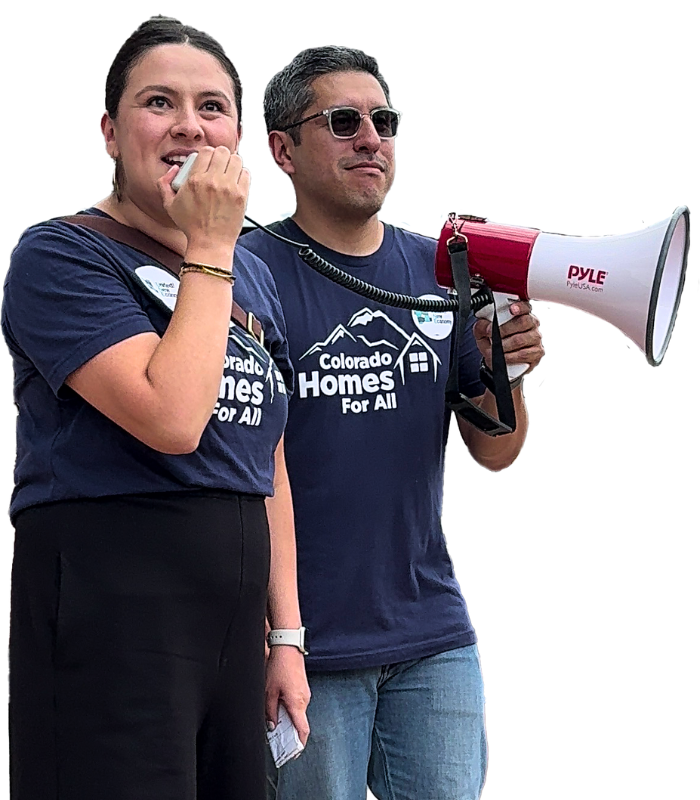
Corporations are increasingly interfering in our democracy in order to block our communities from caring for one another.
All across the country, corporations are increasingly using state law as a tool to shape public policy in ways that benefit their bottom lines. By buying, bullying, and bamboozling our state elected leaders into supporting harmful preemption legislation, corporations block our freedom to create policies that benefit our families and neighbors. This is just the latest tool in their toolbox: using money, threats, and misinformation to pass sweeping bans on local policymaking so they can pay low wages, jack up rents, and pump pollution into our communities.
We’re exposing the greedy corporations behind harmful state bans, and organizing campaigns that drive a wedge between corporations and elected leaders to put power back in the hands of our communities.
This year, we invested in deep research, narrative strategy, and capacity building among affiliates and their statewide partners to expose some of the worst corporate villains responsible for harmful state bans. We’re pushing state elected leaders to recognize their responsibility to make the right choice: side with communities, not greedy corporations.
We created new tools and strengthened alignment within statewide coalitions to organize against the corporations responsible for rigging the rules against our communities. We also supported local affiliates in waging powerful community-driven campaigns to win back power for workers and renters. By focusing on corporate villains and putting a fire under elected leaders to make the right choice, our affiliates flexed grassroots power at the state level and built momentum for the longer-term fights ahead.
Advancing our long term agenda
Building Authentic Democracy
Democracy means communities should be setting the rules for corporations, not corporations setting the rules for us. By challenging harmful corporate interference at the state level, we’re restoring our freedom to pass policies that benefit our communities and rein in corporate greed.
Shaping a People’s Economy
Harmful state bans are just the latest tool greedy corporations use to extract as much profit as possible off the backs of our communities. By removing harmful policy barriers they’ve put up against us, we’re unlocking our communities’ freedom to create an economy based on affordable homes, living wage work, and safe and thriving neighborhoods for all.
Growing Civic Organizations
Corporations rely on people feeling alone and powerless against them. By building campaigns and long term organizing homes built on worker, tenant, and neighbor power, we’re creating space for everyday people to exert our collective voice against corporate greed, while shifting power towards communities over corporations at all levels of government.
Reining in Corporate Power
Giant corporations use money, threats, and misinformation to pressure state lawmakers into passing laws that take away our freedoms to care for one another. By exposing their playbook at the state level, we’re stopping them from rigging the rules at all levels of government — so we can advance the local solutions our communities need to thrive.
![Colorado renters rally outside Greystar's corporate office]()
Holding Greystar accountable for the housing crisis and building renter power in Colorado
Building on years of base-building, narrative strategy, and research to address the root causes of Colorado’s housing crisis, UNE launched a powerful campaign this year targeting one of the worst corporate villains behind the housing crisis in Colorado: Greystar Real Estate.
Working closely with PowerSwitch, UNE conducted and released a new report and series of popular education tools to support their base & partners in understanding the role that Greystar and other corporate landlords have played in shaping unjust housing conditions across CO.
As the report reveals, Greystar has led the real estate industry’s meddling in Colorado legislation, working through the Colorado Apartment Association to buy and bully state leaders into maintaining a statewide ban on rent control despite multiple attempts by tenant groups and progressive lawmakers to repeal it. The ongoing Colorado rent control ban massively restricts the freedom of local communities to ensure basic protections including reasonable caps on rent increases.
UNE also sharpened how they talk about corporate landlords engaging in harmful state interference. UNE, along with their statewide partners, aligned around a clear strategy to name Greystar as a leading corporation behind the real estate industry’s harmful treatment of tenants and its toxic interference in Colorado housing laws — while demanding that state elected leaders side with communities over the corporations exploiting Colorado renters.
This approach enabled Colorado Homes for All (a statewide coalition where UNE has brought critical leadership) to more effectively put Greystar and their corporate allies on notice, and create space for elected leaders and the governor to make the right choice by supporting renter‘s rights and power at the state level. This was evident in the coalition’s successful campaign to win For Cause eviction protections in April 2024.
We never would have been able to do this work without having the clarity that PowerSwitch supported us in developing around corporate villains and approaching our organizing from that lens. PowerSwitch also really respected that this wasn’t a traditional corporate campaign, and they worked with us to figure out the corporate power lens — which ultimately meant changing the story of who the villains and heroes are.
We wouldn’t have been as sharp in our demands without the resources and thought partnership they offered. They even helped us with action visuals to ensure we could effectively execute our biggest action this year in order to maximize the public pressure on Greystar.
![Desiree Westlund Cindric]()
Moving into 2025, UNE will continue educating and expanding their base of renters, community members, small landlords, and allies — alongside values-aligned elected leaders — in the long term fight against harmful corporate interference in Colorado housing, economic, and tax policy.
![Rally for Prop A in Missouri]()
Winning historic wage and workplace protections in Missouri
Missouri has a long history of both powerful worker organizing and corporate-driven backlash against hard-won wage and workplace protections. Missouri Workers Center (which grew from the Fight for $15 movement) has been at the center of this fight, leading organizing campaigns for workers’ rights, fighting racism, and winning economic justice across the state.
Since 2013, low-wage workers across Missouri have led organizing campaigns that raised the minimum wage three times. But each time they’ve won, corporations have used money, threats, and misinformation to block workers from taking home their hard-won wages and the fruits of their organizing labor:
In 2015, when workers won a minimum wage increase to $10 in St. Louis, corporations funded and bullied into law a state ban that revoked these higher wages merely three months later.
Meanwhile in Kansas City, after workers fought hard to win a local minimum wage ordinance before the statewide ban took effect, business groups quickly gathered signatures for a referendum that delayed and ultimately blocked Kansas City workers from taking home the wages they had just won.
This year, building on over a decade of fast food and retail worker organizing in the face of notorious levels of corporate greed, MWC alongside their statewide partners successfully passed a historic minimum wage ballot initiative. The passage of Proposition A means that over half a million Missouri workers will see a minimum of $15/hour on their paycheck and up to seven days of paid sick leave annually.
This landmark win is part of MWC’s long-term fight to organize against the interference that corporations like Amazon have used to rig Missouri state law against workers and their families.
By building momentum and unity within their statewide coalition, demonstrating that workers’ rights and economic justice are a priority of the majority of Missourians, and winning vocal support from elected leaders, MWC is positioned to continue eroding the corporate stranglehold over Missouri’s democracy and restore the freedom of Missourians and their leaders to pass the local solutions and protections that we all need to thrive.
